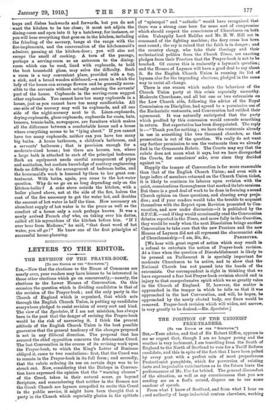LETTERS TO THE EDITOR.
THE REVISION OF THE PRAYER-BOOK.
[To THE EDITOR OP THE " SPECTATOR:] Ein,—Now that the elections to the House of Commons are nearly over, your readers may have leisure to be interested in those other elections which go on concurrently,—namely, the elections to the Lower Houses of Convocation. On this occasion the question which is dividing candidates is that of the revision of the Prayer-book ; and the only party in the Church of England which is organised, that which acts through the English Church Union, is putting up candidates everywhere pledged to resist revision of every sort and kind. The view of the Spectator, if I am not mistaken, has always been in the past that the danger of revising the Prayer-book would be the risk of narrowing it. I think the present attitude of the English Church Union is the best possible guarantee that the general tendency of the changes proposed is not in any illiberal direction. The proposal that has aroused the chief opposition concerns the Athanasian Creed. The last Convocation in the course of its revising work upon the Prayer-book, to which the King's Letter of Business obliged it, came to two resolutions : first, that the Creed was to remain in the Prayer-book in its full form ; and secondly, that the rubrics ordering its use on certain days was to be struck out. Now, considering that the Bishops in Convoca- tion have expressed the opinion that the "warning clauses" of the Creed, taken in their natural sense, go beyond Scripture, and remembering that neither in the Roman nor the Greek Church are laymen compelled to recite this Creed in the publio service, it might have been thought that a party in the Church which especially glories in the epithets of "episcopal" and " catholic " would have recognised that there was a strong case here for some sort of compromise which should respect the consciences of Churchmen on both sides. Unhappily Lord Halifax and Mr. H. W. Hill are in command of the fighting machine; the fiery cross has been sent round ; the cry is raised that the faith is in danger ; and the country clergy, who take their theology and their ecclesiastical polities from the Church Times, are exacting pledges from their Proctors that the Prayer-book is not to be touched. Of course this is eminently a layman's question; and the Houses of Laymen will have a good deal to say about it. So the English Church Union is running its list of laymen also for the impending elections, pledged in the same way to resist all change.
There is one reason which makes the behaviour of the Church Union party at this crisis especially unworthy. Moderate Churchmen, and all but one or two extremists on the Low Church side, following the advice of the Royal Commission on Discipline, had agreed to a permissive use of the Eucharistic vestments, and Convocation had ratified their agreement. It was naturally anticipated that the party which profiled by this concession would concede something in return. But expectation has been disappointed. The reply is :—" Thank you for nothing ; we have the vestments already in use in something like two thousand churches, so that prosecution is out of the question. We really do not want any further permission to use the vestments than we already find in the Ornaments Rubric. The Courts may say that the rubric does not mean what it says, but we have disregarded the Courts, for conscience' sake, ever since they decided against us."
Happily the temper of Convocation is far more reasonable than that of the English Church Union; and even with a large influx of members returned on the Church Union ticket, it is likely to continue its labours upon revision with the quiet, conscientious thoroughness that marked its late sessions. But there is a good deal of work to be done in forming a sound Church opinion on these questions, and clearing away preju- dice; and if your readers would take the trouble to acquaint themselves with the Report upon Revision presented to Con- vocation, and now under discussion—it is published by the S.P.C.K.—and if they would occasionally read the Convocation debates reported in the Times, and more fully in the Guardian, they would be ready when the next Dissolution brings another Convocation to take care that the new Proctors and the new Houses of Laymen did not all represent the obscurantist side of Churchmanship.—I am, Sir, bk., Pas snrrna.
[We hear with great regret of action which may result in a refusal to entertain the notion of Prayer-book revision. At a time when the question of Disestablishment is likely to be pressed on Parliament it is specially important for moderate Churchmen to be active, and to show that the National Church has not passed into the hands of the extremists. Our correspondent is right in thinking that we have expressed a fear lest Prayer-book revision should end in injury to that comprehensive spirit which we so greatly value in the Church of England. If, however, the matter is approached in the temper in which he tells us that it was approached in the last Convocation, and will, he hopes, be approached by the newly elected body, our fears would be removed. Prayer-book revision which will widen, not narrow, is very greatly to be desired.—En. Spectator.]






















































 Previous page
Previous page